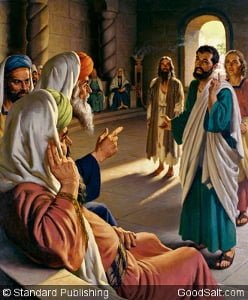The Great Controversy and the Early Church – Hit the Mark
It’s called a do-over – a second chance to redeem a failure. The greater the failure, the greater the significance of achievement the second time around. We celebrate those who make the most of their do-overs. To see someone who has failed miserably yet, when again faced with that same situation, triumphs, gives us much encouragement.
 The overwhelming success of the early church is a lesson in making the most of do-overs and no one character’s do-over was as pronounced as Peter’s. After Peter’s epic failure in denying his Lord, he became a new man. The converted Peter was no longer impetuous and boastful. His focus in life was singular, clear and complete.
The overwhelming success of the early church is a lesson in making the most of do-overs and no one character’s do-over was as pronounced as Peter’s. After Peter’s epic failure in denying his Lord, he became a new man. The converted Peter was no longer impetuous and boastful. His focus in life was singular, clear and complete.
You can get a sense of the new Peter by his temple encounter with the man who was lame from birth. While the lame man hoped for some shekels to assist in his living, he instead heard this classic declaration from Peter:
“Silver and gold have I none; but such as I have give I thee: In the name of Jesus Christ of Nazareth rise up and walk.” Acts 3:6
With an enthusiasm that could not be contained, the healed man attracted the attention of everyone around. Rushing to the scene of the commotion, the people were stunned to see this cripple of forty years now jumping about and praising God.
As we are prone to do, the people looked at Peter and John with wonder and fascination. The old Peter might have taken some personal satisfaction in what had just occurred. The old Peter might have seen this as an evidence of his qualification to be greater than his peers. But this was the new Peter.
“And when Peter saw it, he answered unto the people, Ye men of Israel, why marvel ye at this? or why look ye so earnestly on us, as though by our own power or holiness we had made this man to walk?” Acts 3:12
In Peter’s response we see the evidence of true conversion. When the glory for anything good we do goes to God, it is evidence of true conversion. When it is no longer about us, when false humility is abandoned and our purpose for living is to magnify the name of Jesus alone, it is evidence of true conversion. Peter was converted.
In the excitement that overtook the temple, the religious rulers took notice. Their worst fears were being realized. The name of Jesus was being magnified, and the threat against their status among the people was again in jeopardy. To stop this they arrested Peter and John. The next day as the trial began we get a sense of the magnitude of the moment by those in attendance.
“And it came to pass on the morrow, that their rulers, and elders, and scribes, And Annas the high priest, and Caiaphas, and John, and Alexander, and as many as were of the kindred of the high priest, were gathered together at Jerusalem.” Acts 4:5-6
Here, in this very room, Peter had had the greatest failure of his lifetime. No doubt many of those in attendance were there the night Peter denied his Lord. Certainly it was hoped for and probably expected that the same intimidation and fear of consequences would have the same effect upon Peter. But Peter had come full circle and now it was his life on the line.
“And when they had set them in the midst, they asked, By what power, or by what name, have ye done this?” Acts 4:7
We can only try to imagine what that moment must have been for Peter. He could never erase what he had done and, although he had been forgiven, he could never totally forget the pain of his desertion. He had formerly relied on himself, and his self-confidence had almost cost him everything. By God’s grace Peter had become converted, and this time around, with a Holy Ghost boldness, Peter testified of his Master and Saviour.
“Be it known unto you all, and to all the people of Israel, that by the name of Jesus Christ of Nazareth, whom ye crucified, whom God raised from the dead, even by him doth this man stand here before you whole. This is the stone which was set at nought of you builders, which is become the head of the corner. Neither is there salvation in any other: for there is none other name under heaven given among men, whereby we must be saved.” Acts 4:10-12
Peter was victorious. Not just in his boldness to testify for his Lord in the face of fierce opposition, but also in his victory over self. Peter’s complete devotion to Jesus was typical of the members of the early church. Each victory recorded, including the stoning of Stephen, was won by individuals who were sold out, committed, focused and determined.
And in Peter we find encouragement to keep going. No matter our setbacks, no matter our defeats, as long as God has given us breath, we can begin again. Take some encouragement from the words of this YouTube song: You Can Begin Again.
Here are a few Hit the Mark questions for this week’s lesson discussion:
- What does being converted mean to you?
- What does it mean to be bold for God?
- What allowed the early church to be successful?
- Is it true that the church of today is not as successful as the early church and if true, why not?
- What lessons can we take from Peter’s failure and his leadership in the early church?
- Should the church of today welcome persecution or do everything in its power to avoid it? Explain your answer.
- Is the following statement True, Mostly True, Somewhat True or Not True: The greater the sin in the past, the less qualified one is to lead out in the present. Explain your answer.
We close this week’s lesson on The Great Controversy and the Early Church with the memory text for the week. It’s a very clear picture of how these men lived.
“Now when they saw the boldness of Peter and John, and perceived that they were unlearned and ignorant men, they marvelled; and they took knowledge of them, that they had been with Jesus.” Acts 4:13
Until next week, let’s all continue to Hit the Mark in Sabbath School.
Click headphones to listen to the Audio Version

